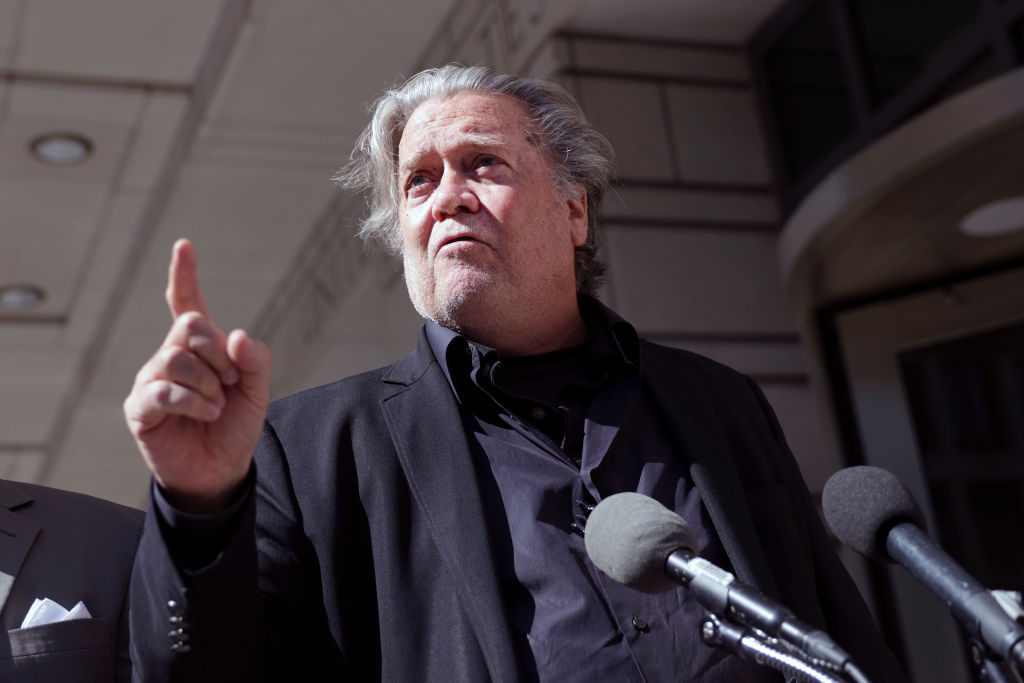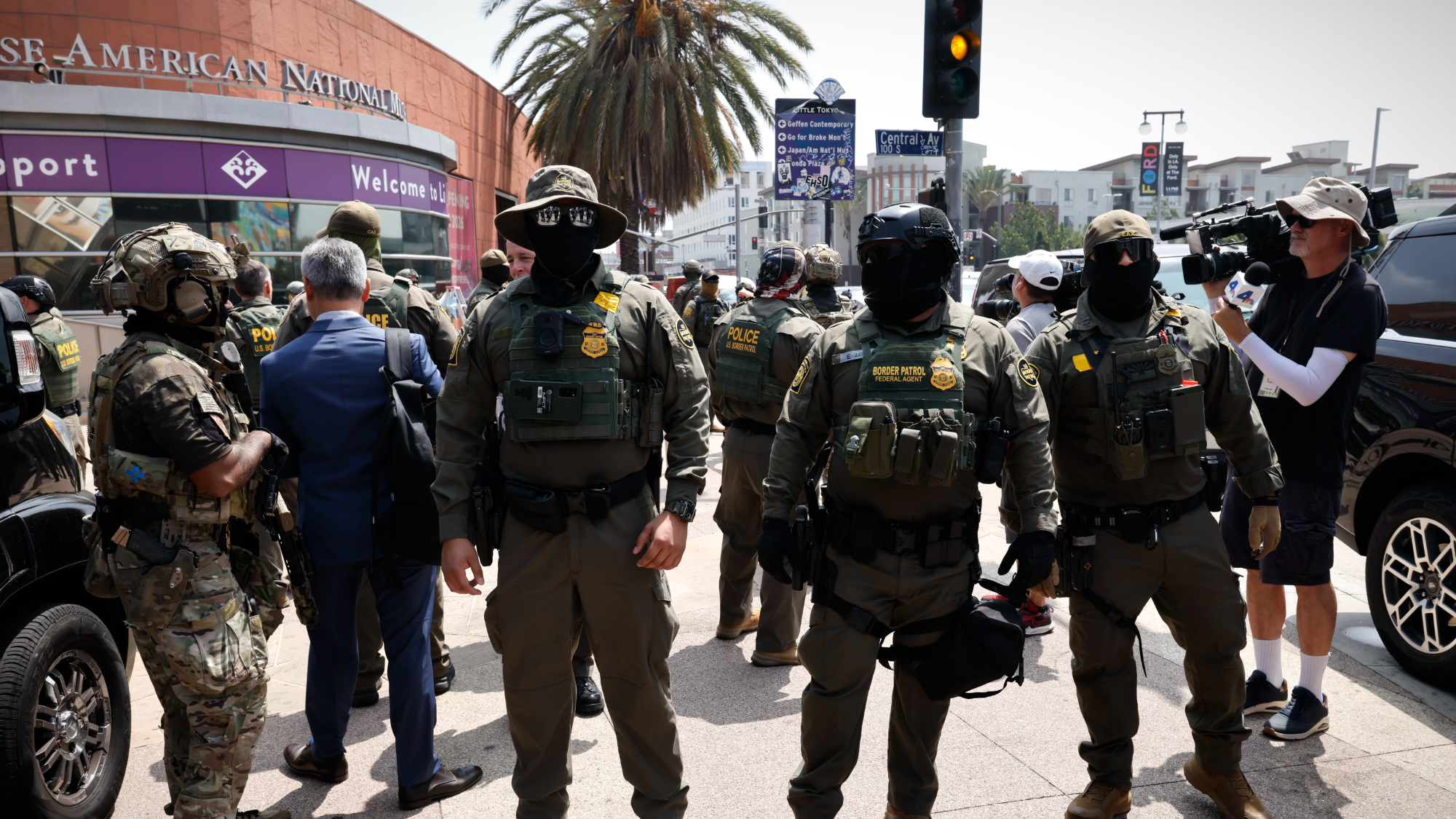Steve Bannon's contempt of Congress trial is expected to be swift


A free daily email with the biggest news stories of the day – and the best features from TheWeek.com
You are now subscribed
Your newsletter sign-up was successful
Stephen Bannon, former President Donald Trump's one-time strategist and campaign chairman, is going on trial Monday to face two counts of contempt of Congress over his flouting of a subpoena from the House Jan. 6 committee. U.S. District Judge Carl Nichols, the Trump appointee overseeing Bannon's trial in U.S. District Court in Washington, D.C., rejected most of Bannon's proposed defense strategies in hearings last week.
"What's the point of going to trial if there are no defenses?" Bannon lawyer David Schoen asked after Nichols threw out Bannon's proposed motions to delay the trial, put prominent Democrats on the stand for questioning, and take shelter under what Bannon unsuccessfully claimed was Trump's invocation of executive privilege. "Agreed," Nichols replied.
That was Nichols' way of urging Bannon to seek a plea deal to avoid a short trial he is very likely to lose, George Washington University law professor Randall Eliason told The Washington Post. "Obviously everyone's entitled to a trial, but usually if you go to trial there's some kind of legal or factual dispute that needs to be resolved," he explained. "The judge's point is, there aren't really any here. ... In those instances, going to trial becomes what prosecutors sometimes call a long guilty plea."
The Week
Escape your echo chamber. Get the facts behind the news, plus analysis from multiple perspectives.

Sign up for The Week's Free Newsletters
From our morning news briefing to a weekly Good News Newsletter, get the best of The Week delivered directly to your inbox.
From our morning news briefing to a weekly Good News Newsletter, get the best of The Week delivered directly to your inbox.
Jury selection is slated to begin Monday, and once a jury is seated, "the trial is likely to be brief — prosecutors say their case will take a day, and given the judge's limitations on which witnesses Bannon can call and what issues he can raise, it's unclear how long Bannon's own case may take," the Post reports. Each count Bannon faces carries a minimum 30-day sentence and maximum one year in prison, but prosecuting contempt of Congress is exceedingly rare, and Bannon's case is unusual in other ways.
Bannon has made clear he will not plead guilty. "Pray for our enemies, because we're going medieval on these people," he said in a recent podcast about his upcoming trial. "We're going to savage our enemies."
Given Bannon's long odds at trial, he may be refusing to negotiate a plea deal to preserve his right to appeal, or "maybe it's just a show to him, one where he can play the MAGA martyr and use it to raise his profile," Eliason said. "That's not a legal reason to go to trial but it may be enough of a reason for him."
A free daily email with the biggest news stories of the day – and the best features from TheWeek.com
Peter has worked as a news and culture writer and editor at The Week since the site's launch in 2008. He covers politics, world affairs, religion and cultural currents. His journalism career began as a copy editor at a financial newswire and has included editorial positions at The New York Times Magazine, Facts on File, and Oregon State University.
-
 The environmental cost of GLP-1s
The environmental cost of GLP-1sThe explainer Producing the drugs is a dirty process
-
 Greenland’s capital becomes ground zero for the country’s diplomatic straits
Greenland’s capital becomes ground zero for the country’s diplomatic straitsIN THE SPOTLIGHT A flurry of new consular activity in Nuuk shows how important Greenland has become to Europeans’ anxiety about American imperialism
-
 ‘This is something that happens all too often’
‘This is something that happens all too often’Instant Opinion Opinion, comment and editorials of the day
-
 House votes to end Trump’s Canada tariffs
House votes to end Trump’s Canada tariffsSpeed Read Six Republicans joined with Democrats to repeal the president’s tariffs
-
 Bondi, Democrats clash over Epstein in hearing
Bondi, Democrats clash over Epstein in hearingSpeed Read Attorney General Pam Bondi ignored survivors of convicted sex offender Jeffrey Epstein and demanded that Democrats apologize to Trump
-
 El Paso airspace closure tied to FAA-Pentagon standoff
El Paso airspace closure tied to FAA-Pentagon standoffSpeed Read The closure in the Texas border city stemmed from disagreements between the Federal Aviation Administration and Pentagon officials over drone-related tests
-
 Judge blocks Trump suit for Michigan voter rolls
Judge blocks Trump suit for Michigan voter rollsSpeed Read A Trump-appointed federal judge rejected the administration’s demand for voters’ personal data
-
 US to send 200 troops to Nigeria to train army
US to send 200 troops to Nigeria to train armySpeed Read Trump has accused the West African government of failing to protect Christians from terrorist attacks
-
 Grand jury rejects charging 6 Democrats for ‘orders’ video
Grand jury rejects charging 6 Democrats for ‘orders’ videoSpeed Read The jury refused to indict Democratic lawmakers for a video in which they urged military members to resist illegal orders
-
 Judge rejects California’s ICE mask ban, OKs ID law
Judge rejects California’s ICE mask ban, OKs ID lawSpeed Read Federal law enforcement agents can wear masks but must display clear identification
-
 Lawmakers say Epstein files implicate 6 more men
Lawmakers say Epstein files implicate 6 more menSpeed Read The Trump department apparently blacked out the names of several people who should have been identified
